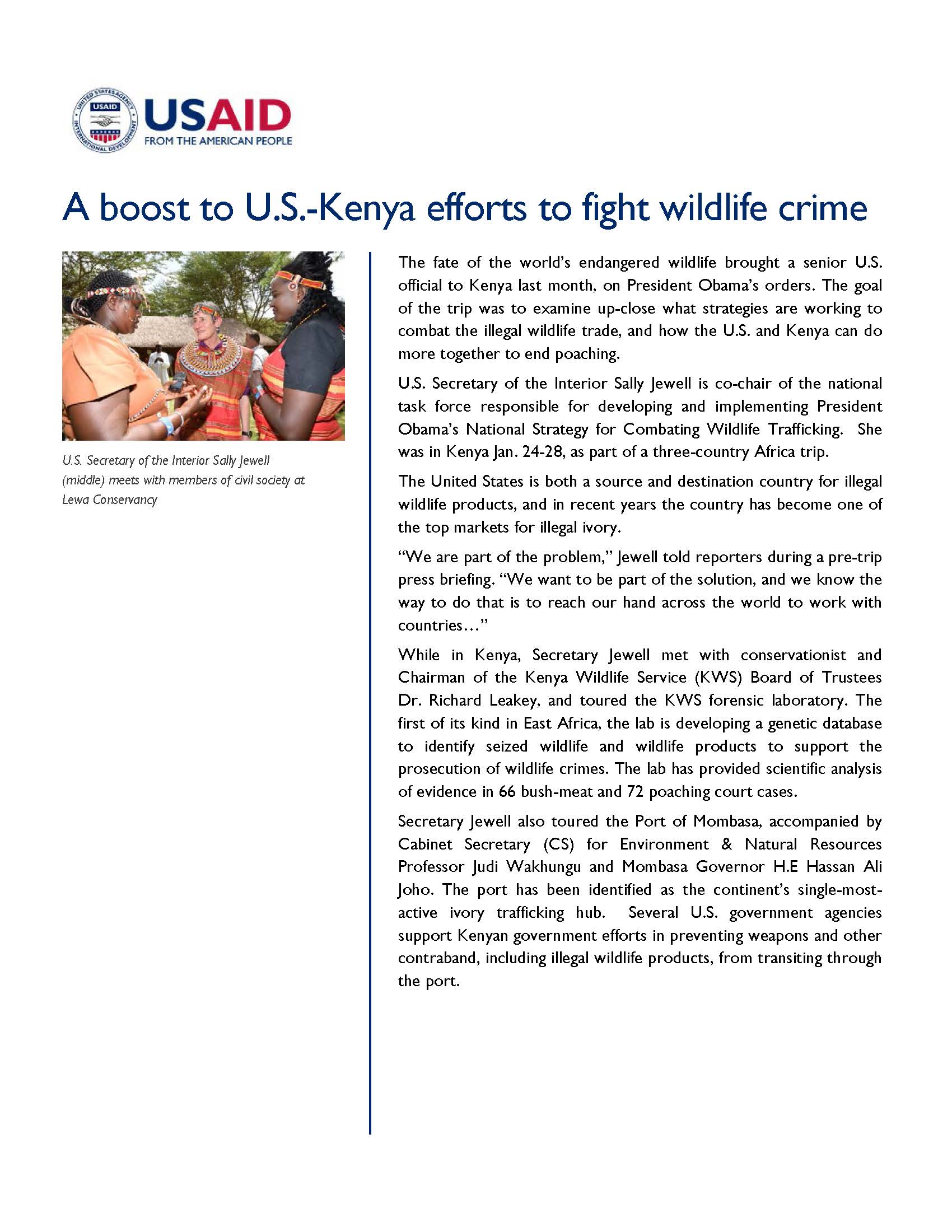Home » A boost to U.S.-Kenya efforts to fight wildlife crime
The fate of the world’s endangered wildlife brought a senior U.S. official to Kenya last month, on President Obama’s orders. The goal of the trip was to examine up-close what strategies are working to combat the illegal wildlife trade, and how the U.S. and Kenya can do more together to end poaching.
U.S. Secretary of the Interior Sally Jewell is co-chair of the national task force responsible for developing and implementing President Obama’s National Strategy for Combating Wildlife Trafficking. She was in Kenya Jan. 24-28, as part of a three-country Africa trip.
The United States is both a source and destination country for illegal wildlife products, and in recent years the country has become one of the top markets for illegal ivory.
“We are part of the problem,” Jewell told reporters during a pre-trip press briefing. “We want to be part of the solution, and we know the way to do that is to reach our hand across the world to work with countries…”
While in Kenya, Secretary Jewell met with conservationist and Chairman of the Kenya Wildlife Service (KWS) Board of Trustees Dr. Richard Leakey, and toured the KWS forensic laboratory. The first of its kind in East Africa, the lab is developing a genetic database to identify seized wildlife and wildlife products to support the prosecution of wildlife crimes. The lab has provided scientific analysis of evidence in 66 bush-meat and 72 poaching court cases.
Secretary Jewell also toured the Port of Mombasa, accompanied by Cabinet Secretary (CS) for Environment & Natural Resources Professor Judi Wakhungu and Mombasa Governor H.E Hassan Ali Joho. The port has been identified as the continent’s single-most-active ivory trafficking hub. Several U.S. government agencies support Kenyan government efforts in preventing weapons and other contraband, including illegal wildlife products, from transiting through the port.
Joined by U.S. Ambassador to Kenya Robert Godec, Jewell formalized new partnerships to combat the illegal trade in wildlife. She signed a Memorandum of Understanding (MoU) with CS Wakhungu and USAID Kenya and East Africa Mission Director Karen Freeman to strengthen government-to-government cooperation between the U.S. and Kenya. This agreement will support Kenyan efforts to combat wildlife trafficking, manage natural resources, and conserve biodiversity; including contributing U.S. expertise to help improve Kenya’s capacity to combat wildlife crime.
While at the Lewa Wildlife Conservancy, Secretary Jewell spoke with community leaders and wildlife rangers to learn more about the highly successful community conservancy model pioneered by the U.S. government in northern Kenya. The network of community rangers and sophisticated anti-poaching systems developed by the Northern Rangelands Trust (NRT), through USAID support, has reduced elephant poaching by 43 percent across supported conservancies since 2012.
Secretary Jewell and USAID Mission Director Karen Freeman signed an MOU with NRT, signaling the U.S. Government’s commitment to strengthen the successful community conservancy model.
As the largest destination market for illegal ivory and other wildlife products, China is also a critical partner in curbing the trade. Secretary Jewell also met with the Chinese Ambassador to Kenya, Dr. Liu Xianfa. The meeting reinforced the need for the U.S. and China to increase cooperation between the two countries, as well as with Kenya and other African nations to end wildlife trafficking.
Secretary Jewell also traveled to Gabon and South Africa during her trip to the continent.
Issuing Country
Date
Friday, February 12, 2016 - 1:00pm








Comment
Make a general inquiry or suggest an improvement.